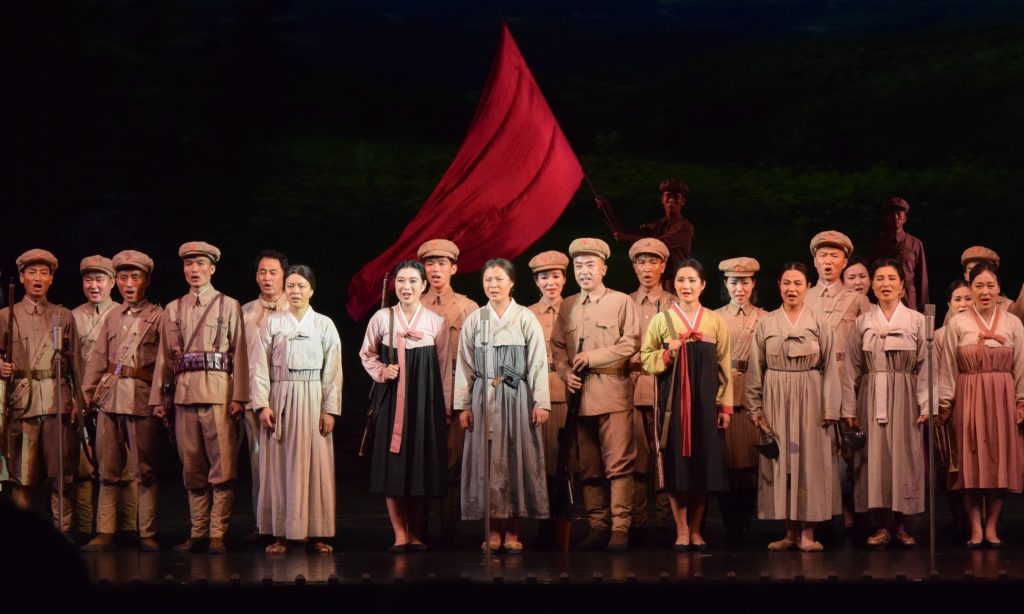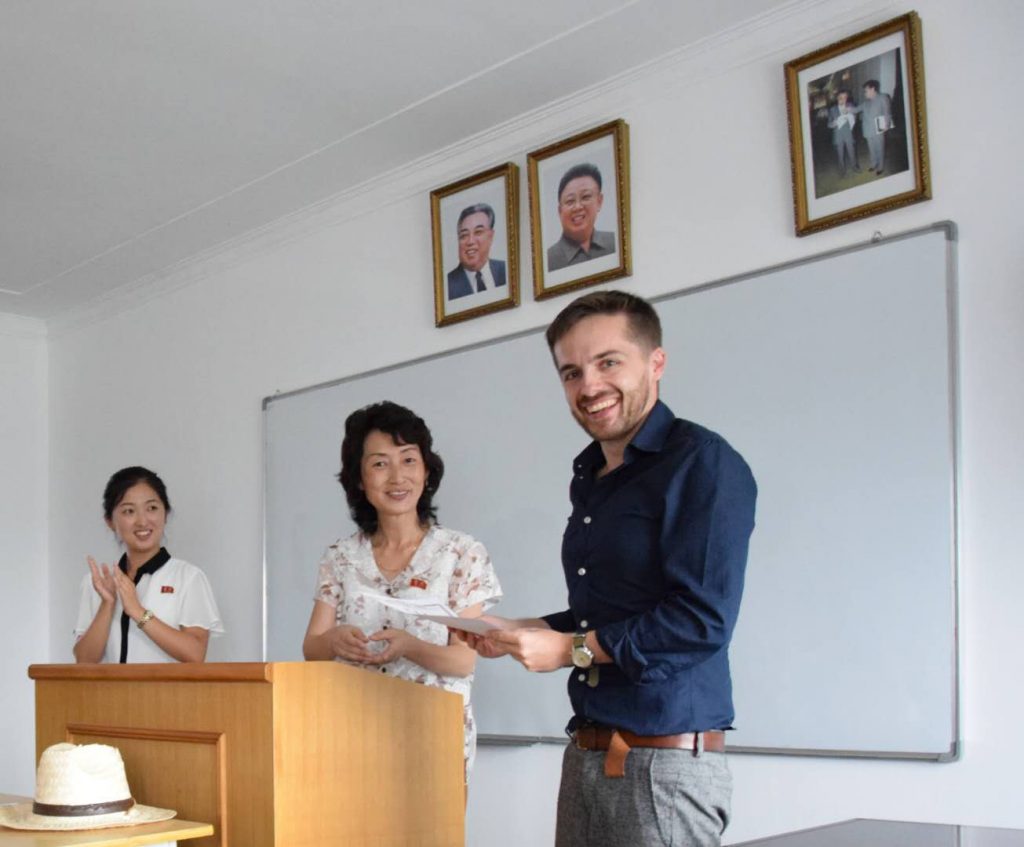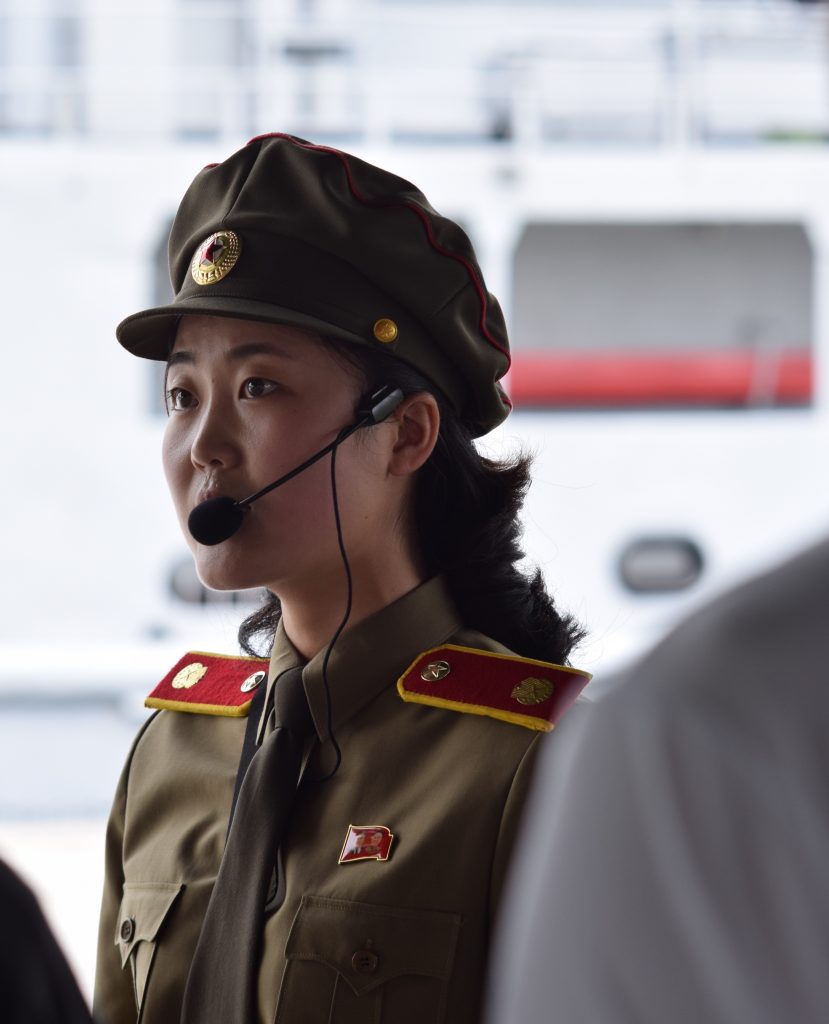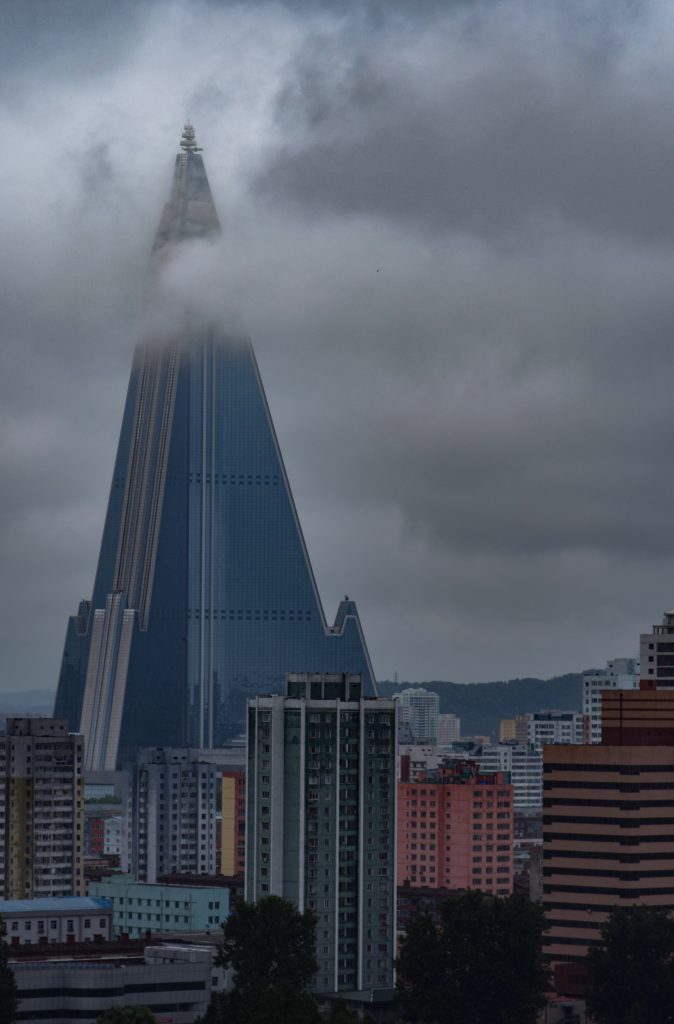With my breath hanging in the December air, and the sun still clambering up out of the sooty haze, Rowan and I set out from YPT’s Beijing HQ for the all too familiar Zhong Gu Hotel near Beijing Railway Station. While this was the fourth time to be heading in to meet with a group of DPRK-bound pioneers at the hotel, it was my first as a tour leader.
As I think everyone does on the first day of any new job, I had a little anxious voice in my head: Would everything go smoothly at immigration? Would everyone get on? Would I be able to answer everyone’s difficult questions? Alongside those thoughts, however, I had a growing feeling of excitement which was much greater than when I had travelled to the DPRK either as a tourist or student.
I found myself thinking back to my first visit to the country, all the questions I had, the moment I had first looked across the Yalu River into North Korea, and all the myriad moments where my perceptions were challenged and changed by the experiences our group had had. I was extremely excited that from now on as a guide, I would be able to see those changes happening in others, see new friendships forming and be able to share my experience and knowledge to help other people have an unforgettable time. My nerves started to melt away, and as Rowan kept assuring me, I had got this!
Meeting the group
Cosy and warm, sinking into the sofa in the hotel atrium, my eyes were glued to the revolving door for what seemed like an eternity waiting for the first of my group to arrive. One by one I saw passport photos coming to life as people stepped in out of the cold. As I started handing out visas I recognised that first flush of excitement when you get your hands on that visa, and happily watched people excitedly taking pictures of their little blue booklets.
Having got a handle on who was who, and saying a farewell to Rowan, I lead my motley and wonderful crew back out into the fierce cold for the short walk to the station, and the beginning of our journey towards ringing in the new year in Pyongyang.
In my opinion, taking the overnight train from Beijing to Dandong is an unmissable part of the experience, especially if this is your first time out to the DPRK, or even first time in China. The time on the train gives you chance to get to know your guide and your fellow pioneers, enjoy a few relaxing beers, and likely strike up a few conversations with your curious Chinese cabin mates. By the time you are woken up either by the guard, or by a Chinese auntie vigorously slurping some green tea, or the sunrise over the forests of North-Eastern China, you already feel a world away from Beijing and that you are on an adventure with a bunch of new friends, in fact one of the things that had drawn me to this role was the great people I had met and bonded with on this journey during previous tours.
As we arrived in Dandong I rapidly recalculated my appraisal of how cold Beijing had been. It was therefore no challenge to get my now sizeable group to huddle around me as I explained to both those who had been on the train, and those who had just joined us in Dandong, both what to expect for the train ride to Pyongyang and some simple rules and advice to make our time in the DPRK as enjoyable and memorable as possible.
Once I had procured an extremely woolly hat, had doled out all the remaining Korean visas and had the train ticket to Pyongyang in my hands, I was starting to feel invincible. It was all going so smoothly, the group was bonding brilliantly, and no-one had asked me a question that completely stumped me. This, I thought, is going to be great.
No man left behind
The first test came hot on the heels of my feeling of euphoria. After getting through the ticket barrier you immediately arrive at Chinese customs and immigration, and I watched the group pass through and make a bee-line for seats in the waiting room, among a great number of Koreans who were also returning home for New Years. Everyone had passed through without a hitch, except for one of my group, a Japanese fellow, who seemed to be trapped in a deeply unsuccessful conversation of hand gestures with a Chinese immigration official.
Seeing the bewildered look of my group member, who was now being spirited away into a side office my heart started beating fast, but this was my ship to captain, so I steeled myself and walked right up to the immigration desk, explained that I was a tour leader and enquired firmly but politely in Chinese as to what was causing the hold up with my group member and why he had been whisked away. The reason for the delay blew my mind.
The official simply couldn’t read the kanji for the name on the passport, whereas having studied traditional Chinese characters due to my interest in calligraphy, miraculously I could! My Japanese pioneer couldn’t speak Chinese, but the immigration officer strangely seemed sure that he must be able to, and had begun to suspect that something fishy was going on.
I whipped out trusty Pleco (an essential dictionary app for life in China) and scrawled the character on screen for him to see the simplified equivalent. The guy was dumfounded and quickly recalled my Japanese buddy from the mysterious back room, and I was briefly enlisted as an impromptu interpreter. After a minute of back and forth, we were waved back through, the immigration officer all the while smiling and shaking his head in disbelief at me, this ‘lao wai’ (foreigner), with peculiar Chinese skills. It had only been ten or so minutes, but it was tense and I was really looking forward to my first celebratory bottle of Taedonggang on the train.
By comparison immigration on the Korean side was a breeze. As usual we made the short trip across the bridge to Sinuiju, where the Korean officers board the train. No sooner than they entered our carriage, one of them had recognised me from the summer I spent studying in Pyongyang and shouted to his colleagues “it’s the ryu hakseng!” (overseas student), and once he found out I was now leading a YPT tour, he proceeded to tell my group how great I would be as a guide, based on what knowledge I am not sure, but with the result that I was simultaneously delighted and embarrassed. After the obligatory paperwork was completed and counting of phones and cameras, we were off again, this time out into the snow-covered wonderland that was the Korean countryside, with the group visibly relaxing as excited banter, questions and speculation flew around as to what the New Year celebrations would hold.
After an hour or so a few of us meandered up to the dining car for lunch (another must in my opinion, as the food on the train is very literally your first taste of the DPRK and the atmosphere is great, more often than not with the Moranbong girls on the telly and plenty of local Koreans eating, drinking and generally hanging out in the carriage). After an hour or so eating our fill, and sharing stories about what had brought us here, we went back to our coach to become embroiled in one of the most ‘character building’ games of my life.
A painful lesson
Three of my group, including my Japanese buddy from the immigration adventure had been befriended by bunch of five Koreans, three women and two men. Firstly, given the tense history between the two nations, it was simply awesome to see Japanese and Koreans interacting so happily, secondly they were playing a really intriguing and slightly more complicated DPRK version of snap, with some painful looking forfeits for the loser. They beckoned me in, and I played the first game learning as I went, thankful for the beginner’s luck which let me dodge the last place spot. Unfortunately, that punishment was lined up for my Japanese friend, (man, it just wasn’t his day) and he bore it with impressive cool.
The second round I started playing confidently, the cards were flying from my hand, and I looked sure to go out quickly and win. My group had already picked up their first Korean words, enthusiastically shouting ‘isseiyo’ (have) and ‘obsoiyo’ (don’t have) as the cards moved around us in the bunks. Then, in a devilish twist of fate, and a cheeky grin from the lady sat opposite me, I felt my luck change. All too soon my hand was full of cards and everyone else had gone out, punishment awaited.
In this game, which I am yet to discover the name of, punishment is determined as follows, the number of cards and the suit of said cards. To begin you must pick a card, show to it everyone, and then someone else in the group will put that card back in the deck. Every player has a turn shuffling the cards, and hands the deck back to you. You cut it one last time, deciding whether you want to start hunting for your card from the top or bottom of the deck. The number of cards it takes to find your card represents the number of punishments to be endured.
So, I turn over the top card and start praying my card will come soon if not immediately. The first card, however, is a something of spade and because it is a spade, is rewarded by a rap with the knuckles on the back of your hand… from every other player. This is the first card, and so everyone lands a fierce blow. Next comes a diamond, rewarded by a slap, and it goes diamond, spade, spade, until my hand blushes in protest, but the worst is yet to come. Next up is a club, which is rewarded with a grisly little pinch of the skin and twist, and after seven of those (one from each player) my hand is really starting to smart.
Now more of the group have magically appeared in the walkway outside the bunks and the train seems fiercely hot. Another club appears, and soon a small bruise is appearing on my previously pale white hand. A few more diamonds come up and I find myself simply grateful that they are not clubs, as its only been about seven cards, but that means forty-nine punishments. Finally some relief, comes in the shape of a heart! It isn’t my card, but on any heart, all players have to tenderly stroke the victim’s hand. This respite is short lived and the punishment continues, with my luck well and truly in the gutter.
After about 10 more cards, I feel the Korean ladies starting to take mercy on me: the pinches are softer, grabbing not much more than air, the slaps have turned into a gentle pat, and the stroking of my hand feels out of genuine care and concern, even gesturing that I can change hands if I want to, but the men are looking into my eyes, I can see that they know I cannot break in front of the group, and show me no quarter; they are having the time of their lives!
Finally, after a couple more cards, at what seems like almost half the deck gone, my card miraculously appears and with now my revolutionary red hand I lift my bottle of beer, drink a toast of relief and then immediately press the cold glass onto the back of my hand, with a strangely elated sigh. I bow out, safe in retreat to mingle with other people in our group, who are all happily chatting and watching the beautiful winter landscape go by.
When, after a few hours the sun slopes off, and on the horizon we see the unmistakable pyramid of the Ryugyong piercing the night sky, I feel the group’s excitement ratchet up a notch. For some the nerves have come back, and the reality of being in this much spoken about, but seldom visited country is kicking in. A flurry of questions come in, as I make sure everyone packs up their temporary train-life, have their passports and visas ready and get ready to step onto the platform and into the Pyongyang night.
















